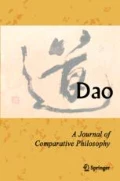Abstract
Contemporary interpretations of Zhuangzi’s 莊子 philosophy as adumbrating a relativist position are legion. However, what is the scope and nature of the relativism that can be gleaned from a comprehensive analysis of relevant passages in the Zhuangzi? In this essay, I shall explain Zhuangzi’s alleged relativist position as motivated from a primary concern about disagreement. He in effect claims that since any disputant can foresee her assertion to be refuted by an opponent, the recourse to a higher tribunal in adjudicating the debate is futile. The consequence of an apparent lack of justification for assertion is, in my opinion, what needs elucidation. For example, is “truth relativism” an apt label for the nature of assertion in a debate without the verdict of a judge? Or, is it more appropriate to shun the concept of truth altogether in our explanation? I deem the contemporary explanation of Zhuangzi’s relativism either trivializes disputation or fails to account for the difference between a claim’s being right and being acceptable. Hence, I shall argue that without the intrusion of a judge as an arbiter of truth, the kind of disputation Zhuangzi practices promulgates faultless disagreement, which does not appeal to the correctness of any perspective in a comparative or absolute sense. In this understanding, Zhuangzi’s advice of harmonizing with both right and wrong is indeed a viable alternative to relativism and dogmatism, both of which do not properly take heed of the point of disagreeing in a disputation.
Similar content being viewed by others
References
Agamben, Giorgio, and Lorenzo Chiesa, trans. 2017. What is Philosophy? Stanford: Stanford University Press.
Allinson, Robert E. 1989. Zhuangzi for Spiritual Transformation: An Analysis of the Inner Chapters. Albany: SUNY Press.
Brandom, Robert. 2000. Articulating Reasons: An Introduction to Inferentialism. Cambridge: Harvard University Press.
Cappelen, Herman. 2008. “Content Relativism and Semantic Blindness.” In Relative Truth, edited by Manuel García-Carpintero and Max Kölbel. Oxford: Oxford University Press.
Chinn, Ewing Y. 1997. “Zhuangzi and Relativistic Scepticism.” Asian Philosophy 7.3: 207–220.
Cohen, Jonathan. 1992. An Essay on Belief and Acceptance. Oxford: Oxford University Press.
Connolly, Tim. 2011. “Perspectivism as a Way of Knowing in the Zhuangzi.” Dao: A Journal of Comparative Philosophy 10: 487–505.
Dummett, Michael. 1993. The Logical Basis of Metaphysics. Cambridge, MA: Harvard University Press.
Elga, Adam. 2010. “How to Disagree about How to Disagree.” In Disagreement, edited by Richard Feldman and Ted A. Warfield. Oxford: Oxford University Press.
Elgin, Catherine Z. 2010. “Persistent Disagreement.” In Disagreement, edited by Richard Feldman and Ted A. Warfield. Oxford: Oxford University Press.
Evans, Gareth. 1985. “Does Tense Logic Rest on a Mistake?” In Collected Papers of Gareth Evans. Oxford: Clarendon Press, pp. 343-63.
Feldman, Richard, and Ted A. Warfield, eds. 2010. Disagreement. Oxford: Oxford University Press.
Fraser, Chris. 2009. “Skepticism and Values in the Zhuangzi.” International Philosophical Quarterly 49.4: 439–457.
Geach, Peter. 1955. “Review of Mates 1953.” Philosophical Review 64: 143–145.
Goldman, Alvin I. 2010. “Epistemic Relativism and Reasonable Disagreement.” In Disagreement, edited by Richard Feldman and Ted A. Warfield. Oxford: Oxford University Press.
Graham, Angus C. 1989. Disputers of the Tao: Philosophical Argument in Ancient China. Chicago: Open Court.
______. 2001. Chuang-Tzŭ: The Inner Chapters. Indianapolis: Hackett.
______. 2003. Later Mohist Logic, Ethics and Science. Hong Kong: The Chinese University Press.
Hansen, Chad. 1976. “Mass Nouns and ‘A White Horse Is Not a Horse’.” Philosophy East and West 26.2: 189–209.
______. 1983a. “A Tao of Tao in Chuang-Tzu.” In Experimental Essays on Chuang-Tzu, edited by Victor H. Mair. Honolulu: University of Hawaii Press.
______. 1983b. Language and Logic in Ancient China. Ann Arbor: University of Michigan Press.
______. 2003a. “Guru or Skeptic? Relativistic Skepticism in the Zhuangzi.” In Hiding the World in the World: Uneven Discourses on the Zhuangzi, edited by Scott Cook. Albany: SUNY Press.
______. 2003b. “The Relatively Happy Fish.” Asian Philosophy 13.2: 145–164.
______. 2003c. “Zhuangzi.” In Encyclopedia of Chinese Philosophy, edited by Antonio Cua. London: Routledge.
Hintikka, Jaakko. 1973. Time and Necessity: Studies in Aristotle’s Theory of Modality. Oxford: Clarendon Press.
Ivanhoe, Philip J. 1993. “Zhuangzi on Skepticism, Skill, and the Ineffable Dao.” Journal of the American Academy of Religion 61.4: 639–654.
______. 1996. “Was Zhuangzi a Relativist?” In Essays on Skepticism, Relativism, and Ethics in the Zhuangzi, edited by Paul Kjellberg and Philip J. Ivanhoe. Albany: SUNY Press.
Kjellberg, Paul, and Philip J. Ivanhoe, eds. 1996. Essays on Skepticism, Relativism, and Ethics in the Zhuangzi. Albany: SUNY Press.
Kölbel, Max. 2003. “Faultless Disagreement.” Proceedings of the Aristotelian Society 105: 53–73.
Lewis, David K. 1996. “Elusive Knowledge.” Australasian Journal of Philosophy 74.4: 549–567.
Liu, JeeLoo. 2006. An Introduction to Chinese Philosophy: From Ancient Philosophy to Chinese Buddhism. Oxford: Blackwell Publishing.
Mair, Victor H. 2000. Wandering on the Way. Hawaii: University of Hawaii Press.
Ming, Thomas, and Aaron Lai. 2016. “Fixing the White Horse Discourse: Zhuangzi’s Proof of ‘A White Horse Is Not a Horse’.” Philosophy East and West 66.1: 271–289.
Passmore, John. 1961. Philosophical Reasoning. London: Duckworth.
Prior, Arthur. 1960. “The Runabout Inference Ticket.” Analysis 21: 38–39.
Van Inwagen, Peter. 1999. “It Is Wrong Everywhere, Always, and for Anyone to Believe Anything upon Insufficient Evidence.” In Philosophy of Religion: The Big Questions, edited by Eleanor Stump and Michael J. Murray. Oxford: Blackwell.
Watson, Burton. 2013. The Complete Works of Zhuangzi. New York: Columbia University Press.
Wright, Crispin. 2008. “Relativism about Truth Itself: Haphazard Thoughts about the Very Idea.” In Relative Truth, edited by Manuel García-Carpintero and Max Kölbel. Oxford: Oxford University Press.
Author information
Authors and Affiliations
Corresponding author
Additional information
Publisher’s Note
Springer Nature remains neutral with regard to jurisdictional claims in published maps and institutional affiliations.
Rights and permissions
About this article
Cite this article
Ming, T. Zhuangzi’s Way of Harmonizing Right and Wrong: Disagreement and Relativism in Disputation. Dao 19, 559–582 (2020). https://doi.org/10.1007/s11712-020-09745-w
Accepted:
Published:
Issue Date:
DOI: https://doi.org/10.1007/s11712-020-09745-w


